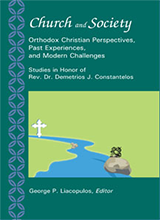George P. Liacopulos, Editor – Church and Society: Orthodox Christian Perspectives, Past Experiences, and Modern Challenges. Reviewed by Joseph A. Loya, O.S.A.
(Journal of Ecumenical Studies, 43:4, Fall 2008. Reviewed by Joseph A. Loya, O.S.A. teaches at Villanova University, Villanova.)
This Festschrift, honoring the Rev. Dr. Demetrios J. Constantelos, is a substantial orchestration of letters, papers, and essays from twenty-six contributors, plus a short photo album. Near the beginning of the work, the editor thoughtfully included Demetrios’s favorite poem by Georgios Drosines (1859-1951), here excerpted: “I don’t want to be the sparkles reflecting on the sea … I’d rather be an oil lamp with my humble flame so small shining the light within me” (p. xliii). This flame was ignited and is fueled within the honored scholar, educator, pastor, and ecumenist by the haunting World War II memory of the German occupation of Greece and a false portrayal by a graduate-school professor of Orthodox Christianity’s supposed lack of concern for physical and social well-being. The rays of this small flame spread to dispel the darkness of ignorance and error regarding the nature of history, philanthropy, Holy Tradition, and the interrelation of faith and culture.
The formal footnoted materials are divided into five sections: Church History, Theology and Spirituality, Church and Society, Canon Law, and Hellenism. Individual contributions of unequal length (eight to forty-eight pages) together serve a wide range of interest levels. The following efforts are commended as models of clarity and substance: Emanuel Clapsis on wealth and poverty in Christian Tradition, John Thomas on imperial Byzantine monasteries, John Chryssavgis on monastic spirituality, Ambrose-Aristotle Zographos on pedagogy for mission, and Thomas Heffernan on paths to Christian sanctity. Also, Theodore Stylianopoulos offers insightful, fair, and balanced remarks on Bible-translation criteria. These serve well as excellent entry-level treatments. Readers are sure to find in each of the five subject areas solid specialized studies for finely focused needs.
Two papers relate immediately to ecumenical concerns. The contribution of Vassilis Vitsaxis bears the imposing title, “The Concept of Christian Love compared to Similar Concepts in Ancient Greek Philosophy and Other Major Religions of the World.” The nature of Christian love is identified, quite properly, as possessing the quality of being “undivided and total, mobilizing all inner forces of human being” (p. 128). As such, the Christian perspective on love is judged by Vitsaxis to be more universal and less legalistic than the Hebrew Bible view. He faults Islamic charity for its lack of emotional connotation. Hinduism’s concept of ahimsa (no harm) is portrayed as a psychological attitude or behavior with universal application but without a divine referent. Karuna (compassion) of Buddhism is “deprived of any emotional element” (p. 143). This emphasis on the emotive “inner force” sounds discordant to this reviewer’s ecumenical ear. It is the volitional rather than emotional human faculty that should be accorded precedence in the Christian perspective. (To illustrate: the divine command to love one’s enemies directly engages one’s will, not one’s feelings.) The topic of love should thus possess significant capital for convergence, not divergence, in interreligious dialogue.
Patrick Viscuso provides an overview of Constantelos’s views on marriage, judging the view as “radical in its vision and a recasting of previously accepted Byzantine norms” (p. 319). This judgment is conditioned in part by Constantelos’s reported conviction that the essential nature of marriage can be recognized among non-Orthodox in cases where the subjects are Christians who (1) were baptized in the name of the Trinity and (2) profess the Nicene-Constantinopolitan Creed. In Orthodox teaching, it is the sacerdotal blessing that establishes marriage. According to Constantelos, earlier models that based the formation of marital unions on the exchange of consent may better serve the church in pluralistic societies. His speculation that the recognition of marriages contracted by Orthodox outside the institutional church and/or with non-Christians would prevent loss of Orthodox membership seems sound – though, as is commonly known, the Orthodox Tradition eschews playing a “numbers game” in determining a church teaching or policy.
This reviewer learned by independent discovery that this volume experienced an extended and difficult production process. The above-mentioned poet Drosines had occasion to assert, “I will despise an easy trophy and only relish a hard-won one.” This work, judiciously consulted, is a worthy trophy for one’s bookshelf.

